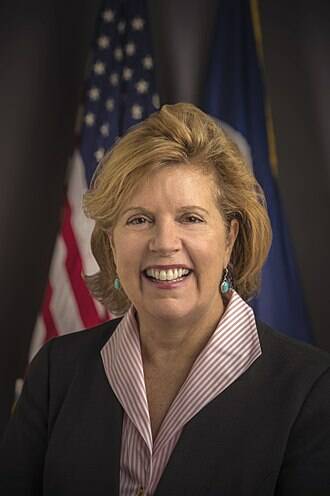The state’s new leader for rural development spent four days in the Rio Grande Valley this week to better understand the region and her role.
Lillian Salerno, state director of the Department of Agriculture’s rural development office, visited colonias in Hidalgo and Starr counties.
“The South Texas area is so important for all of Texas and the country, and it has all of its nuances and its special character of that part of Texas due to its proximity to the border,” Salerno said in an interview Thursday.
Salerno, a native Texan, comes from a rural farming community so small that only 18 people graduated in her high school class. She’s relying on her background for a deeper understanding of her role.
“I’m very familiar with the rural part of Texas and all the great things about it, and also those things that hold you back,” Salerno said.
Salerno pursued an undergraduate degree in Latin American studies from the University of Texas at Austin, received her master’s degree in criminal justice from the University of North Texas and obtained a law degree from Southern Methodist University. As a bilingual attorney, she often worked as a court-appointed counsel for vulnerable Spanish-speaking Texans.
The new director is no stranger to the USDA’s rural development office. She previously worked with the Obama-Biden administration for six years as the rural business administrator and later as a deputy undersecretary for rural development.
She also served as a member of the White House Rural Council, where she voiced concerns for rural Americans and strove to improve economic development, innovation, entrepreneurship and access to capital for farmers.
Those concerns resurfaced during her visits with Valley residents this week.
“They have a lot of challenges because of the drought, making sure their water sources are in shape, and having responses for fire and ambulances,” Salerno said. “That’s why they’re asking for relief.”
Colonia residents and others mentioned the drought in nearly every conversation, the director said, but they were also concerned about the economy.
And that’s where the USDA steps in. The six USDA offices in the Valley are trying to connect rural areas with opportunities the department offers.
“We have community facilities loans and grants where the federal government, under USDA, just for rural communities … gives out low-interest loans or grants so they can purchase ambulances, fire houses, city halls — things small towns can’t afford without a little bit of federal help,” Salerno said.
The department’s programs extend to individual families, too.
“We also have a whole housing portfolio where we give out loans for single family houses and also to do repairs to people’s roofs, insulation and that kind of thing,” she said, adding she noticed a lot of need in Starr County.
During her tour of South Texas and beyond, she’s working to meet with community leaders who might be able to spread the word of the help that exists for those struggling through the pandemic, inflation and, now, recession.
“Part of my goal is for those folks who direct these communities — whether it be mayors, town councils, fire chiefs, police, school board members, folks in the communities — (to) know what we do,” Salerno said. “I want to make sure Texans get their fair share.”




